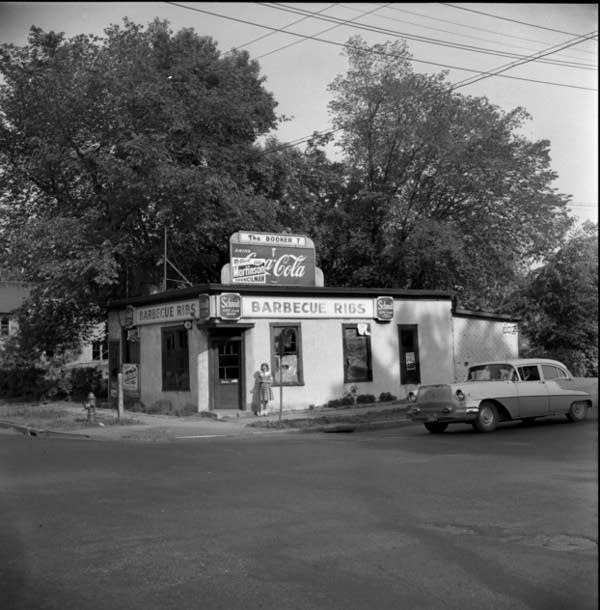In memories of St. Paul's Rondo, a young woman finds home

Go Deeper.
Create an account or log in to save stories.
Like this?
Thanks for liking this story! We have added it to a list of your favorite stories.
Editor's Note: When construction crews bulldozed St. Paul's Rondo neighborhood to make way for Interstate 94 in the 1960s, they destroyed the center of the city's African-American life, forcing many of the community's residents to move. But the spirit of Rondo lives on among its former residents and their descendants. Among them is Daina Stanley, a University of Tampa junior. When she spoke with members of her family about the Rondo they knew and loved, that helped her find home.
When I was 10 my family moved from St. Paul to a mostly white suburb. My parents had immersed me in African-American history from an early age, but after the move, things changed. I began to lose pride in my culture. My mom, Stacie Stanley, says this is exactly what she and my dad were trying to avoid.
"It's this idea of moving out to the suburbs for a better education and you think that you're staying connected because you're going to church or something like that," she said. "But the reality is, as much as you may connect and be at church on Sunday, maybe for an event during the week, it's just not the same."
Not the same as living in the city or in the heart of the black community. I remember riding bikes with my brother and sister when two white men in a passing car shouted racial slurs at us. After that and similar incidents, I started to feel like an outcast in my new neighborhood. Even though my parents made an effort to keep us connected to the African-American community, being in a predominately white school caused an identity crisis.
Turn Up Your Support
MPR News helps you turn down the noise and build shared understanding. Turn up your support for this public resource and keep trusted journalism accessible to all.
Seeing pictures and hearing the stories of my family helped me reclaim my history
When I was in high school my mother had an epiphany about who my siblings and I really were.
"You guys were really middle class suburban kids, and that's a different experience," she said.
Different from what my mother experienced. She grew up in St. Paul as a daughter of Rondo. My grandmother, my great-grandmother, and my great-great grandmother lived in Rondo. My ancestors owned houses and were founding members of Mt. Olivet Baptist Church. They owned businesses too, including the Booker T. Cafe and Tavern. In fact, that's where my grandfather, Luther Jones, met my grandmother, Crola. He was a 23-year-old Air Force ammunitions specialist stationed at Fort Snelling. He showed up one night at the Booker T.
"So I set down at the bar and I ordered a Miller High Life and I said, 'and you along to talk to me while I drink it,'" he recalled. "She said, 'Mister, I just served the beer; I don't go along with it.'"
Grandpa married my grandma the next year.
I only recently heard this story, but it's the type of story Grandpa told all the time when I was growing up -- stories about my family's life in Rondo. These stories had more meaning after I started researching my family history this year.
I've learned my family has deep roots in Rondo. There's even a picture of the bar where my grandparents met at the Minnesota Historical Society.

And we have pictures at home, too. When Daisy Mae Harper, my grandmother's first cousin, flipped through a photo album and found a picture from the 1940s, it brought tears to my eyes.
In the photo, relatives are standing outside a house in Rondo. It's one of the few childhood photos I've seen of my grandmother and the first time I've ever seen a picture of my great-great grandparents.
Cousin Daisy smiles while she tells me what Rondo was like when she and my grandmother were growing up.
"I miss the baseball games. I miss the ice-skating. I learned to ice skate with a pillow on my butt and I tried to walk across over there and fell and everything," she said.

Back then, she said, everybody watched out for everyone else.
"You could leave your doors open, you could leave the windows open. People would always be there checking," she said.
I wasn't born in Rondo and I never lived there, but I am connected by the lives of my ancestors.
Seeing pictures and hearing the stories of my family helped me reclaim my history. My mother hopes this journey guides my future.
"Because too many folks are unconsciously ashamed to be African-American and I think it just gave that sense of pride and just natural sense that African-Americans are successful. You know, that was the hope," she said.
I wasn't born in Rondo and I never lived there, but I am connected by the lives of my ancestors. I have found that home is neither in the white picket fences of the suburbs in nor the vibrant streets of Old Rondo. Home is in me and I carry the spirit of Rondo.



